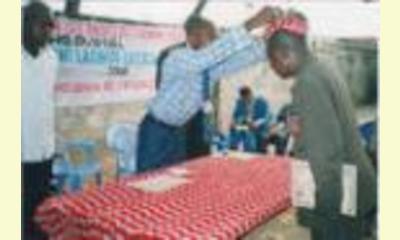|
|
Our Actions for a Culture of Peace in the Democratic Republic of the Congo
an article by MEDARD DU ROHER-BOPE, President, JFDHOP
The year 2011 is an election year for the Democratic Republic of
the Congo (DRC). The DRC is in a post-conflict situation and its
conflicts (wars) have caused great suffering, especially violence
against women. Once again this year, our organization "Youth and Women
for Human Rights and Peace" (JFDHOP) has undertaken numerous initiatives
concerning the elections and respect for the rights of women. 
Here
are some of the actions that we have undertaken this year, based on our
experience gained in programs of the United Nations Decade for a
Culture of Peace and Non-violence for the Children of the World
(2001-2010).
In January our organization joined up with the
National Coalition of Education for All (CONCEPT), a national network to
promote the World Education Campaign, and we took part in a meeting of
electoral observers organized by the Carter Center of the DRC.
In
February, we took part in the work of case studies organized by the The
Inter-Agency Network for Education in Emergencies (INEE).
Beginning
in March, we have worked with the sub-commissions of UNICEF on the
theme of violence against women, and with UNDP on "Gender and
Elections".
In April, our organization participated in an
workshop organized by the Carter Center with the theme of "All for a
Peaceful Election."
From May until the present time, we have been working as observers and trainers on the revision of the election rolls.
Our
organization has continued working to promote sensitivity about sexual
violence since the beginning of the year. In this regard, we
participate regularly in the legal sub-commisions at the Centre Bethanie
of the Commune of Gombe organized by MONUSCO (the United Nations
Organization Stabilization Mission in the Democratic Republic of the
Congo).
(Click here for a French version of this article)
|








|
DISCUSSION
Question(s) related to this article:
Can you add to this analysis of the Democratic Republic of the Congo?
Thematic forum(s) in which this article is being discussed:
GLOBAL MOVEMENT - MOUVEMENT MONDIAL
LATEST READER COMMENT:
Evolution of the Peace Process in the Democratic Republic of Congo
submitted to CPNN in French by Solidarité avec les Victimes et pour la Paix and translated into English by CPNN
For the original article in French, see RDC Solidarite.
From the recent past to today
After
the armed hostilities in 1996 and the fall of Mobutu in May 17, 1997,
there was a period of relative calm for fourteen months. A new rebellion
began on August 2, 1998. Very early, negotiations started in Lusaka
(Zambia) and arrived at the first agreements of ceasefire dated from
July 10, 1999. It was to oversee respect of these agreements of Lusaka
that the Security Council of the United Nations set up its resolution
creating the Observation Mission of the United Nations (MONUC).
It was in October 2006 that the first free elections were organized.
To
establish an account of the situation is difficult, but it is easier to
say that at the present time the effects of armed conflict are still
sad at various levels. There is extreme poverty in the civilian
population. Until the present a responsible solution has not been
found to assure access of children to education.
Good news today
is that the country now has a Constitution, a President of the Republic,
a Parliament and a Senate and provincial assemblies as well as
provincial governments following the democratic elections organized in
2007.. . ...more.

|
|
|
This report was posted on July 7, 2011.
If you wish to start a new discussion topic on this article, please copy the title of this article which is Our Actions for a Culture of Peace in the Democratic Republic of the Congo and its number which is 496 and enter this information along with your discussion question and an introductory response to the question here.

A few stories are retained on the main listings if they are considered
by readers to be a priority. If you have not already done so, please
take the time to check a box below: should this article be considered as
a priority?

|







